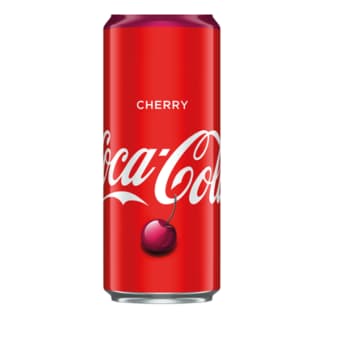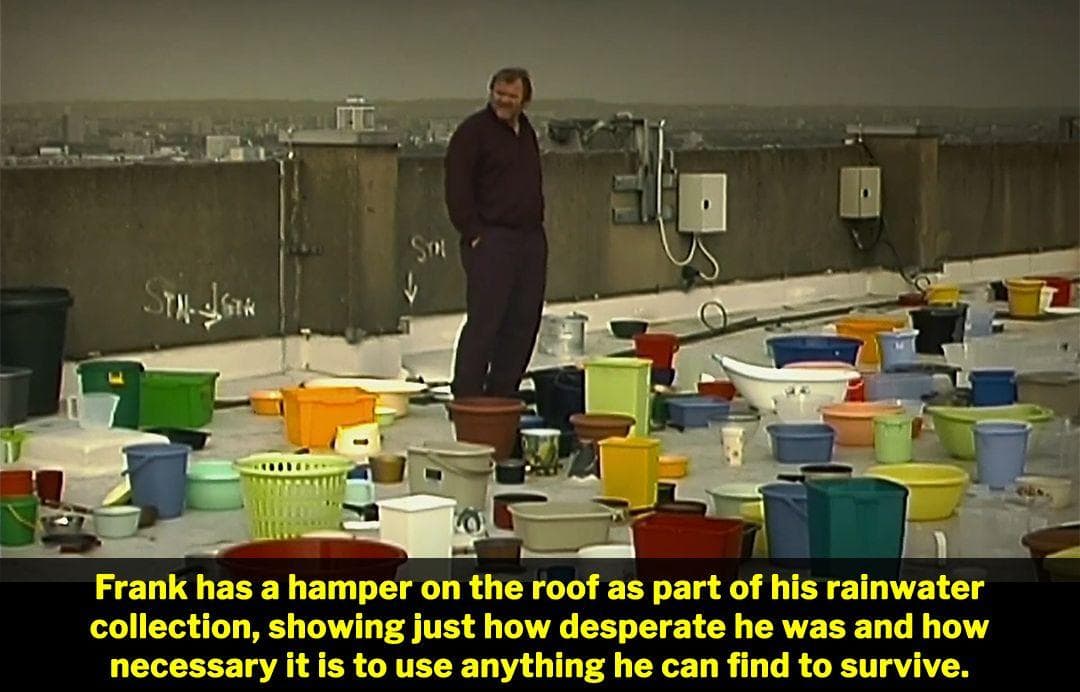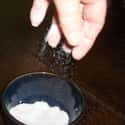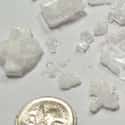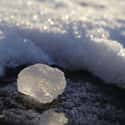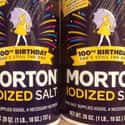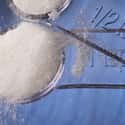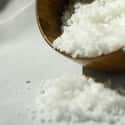-
(#1) Without Salt, You Die
Maybe you think you need less salt in your diet. While that might be true, under no circumstances should you completely cut salt out of your life. Your cells need salt to function, and having none can actually kill you. In fact, there have been cases of people drinking so much water that they dilute the salt in their bodies, which leads directly to their death. In short, you need salt to live. -
(#2) With Too Much Salt, You Also Die
It may be true that you need some salt to live, but you can also die if you have too much. In the long term, too much salt can raise your blood pressure and give you heart problems. In the short term, you can actually eat so much salt that your body can no longer function. In order for this to happen, you would have to basically be force-fed more salt than any person would consume on their own, dehydrating you drastically, but it is possible. So, everything in moderation. -
(#3) Roman Soldiers Traded Their Pay for Salt
It's a common misconception that Roman soldiers were paid in salt, the origin of the modern word "salary." In reality, this is only partially true. Soldiers were given actual money, but that money was used to buy salt, which at the time was a very valuable and necessary item. The Latin word salarium was the term for the soldiers' pay, and from there we eventually got the word "salary." -
(#4) Salt Used to Be More Valuable Than Gold
Has anyone ever told you that you were "worth your salt?" For the ancient Carthaginians, that was high praise indeed. For them, salt was valued as equal to its weight in gold, if not more! It was even sometimes called "white gold" because of its great worth. It is from this high-value trading that we get the previously mentioned compliment, so it's definitely one to take to heart. -
(#5) Salt Lets Your Cells "Talk"
Every blood cell, every skin cell, every bone cell, every single individual cell inside your body has a little salt in it, no matter what part of the body it's in. The salt in these cells allows electrical impulses to be passed within and between cells, allowing different parts of the body to communicate with one another, and for the cell to communicate with itself. -
(#6) We Sprinkle More Salt on the Street Than on Our Food
One would think that most of the salt that we process is used for food, but that's simply not the case. The vast majority of salt, almost 70% of it, goes into industrial chemicals. Only 6% is actually meant for food, which is less than the 8% used on roads every winter to get rid of snow and ice. That's right, our streets consume more salt every year than we do. -
(#7) Thanks to Da Vinci, Spilling Salt Is Considered Bad Luck
Have you ever wondered why spilling salt is considered bad luck? Salt was highly valued in the ancient world, so it makes sense that wasting it would be unlucky, but we owe that particular superstition mostly to Leonardo da Vinci. In his famous painting The Last Supper, Judas the traitor is seen having knocked over a container of salt on the table. Because of this, we now see spilled salt as a sign of bad fortune. -
(#8) Mummies Are Packed Full of Salt
Though the entire mummy-making process can seem a little mysterious, we actually have a pretty good idea of how it was done. Part of the process involved covering the body in natron, which is a substance found naturally in Egypt even today. This substance is, you guessed it, a salt. The salt was placed inside the body as well, in order to quickly dry everything out. Even the organs were preserved in this manner, then placed in jars. -
(#9) All Roads Lead to Salt
The first great Roman road was called the Via Salaria. Sound familiar? That's because it indirectly translates to "Salt Road," which is exactly what it was. This road ran from Rome all the way to the Adriatic Sea. It was used as a means of transporting salt from the Roman salt works to trade routes, as well as to the Roman people. So, rather than having "all roads lead to Rome," there was a time when all major roads led to salt. -
(#10) Iodine Was Added to Salt to Prevent Goiters
You've probably had iodized salt recently, and this kind of salt has been around for almost 100 years. It all started in the 1920s, when citizens of the Pacific Northwest part of the United States, including the Salt Lake region, were suffering from iodine deficiency. This deficiency led to goiters, an enlargement of the thyroid gland that leads to a large lump in the throat. The government created an initiative to combat goiters by adding iodine to salt, and thus we still have iodized salt today. -
(#11) IV Fluids Are Based on French Seawater
You might know that IV fluids are a salt solution meant to hydrate the body. But the origin of these life-saving fluids is surprising. Back in the late 1800s, there was a man named René Quinton, who started finding similarities between salty seawater and the fluids in our own bodies. After much experimenting, he administered a diluted seawater solution to animals and humans and noticed its beneficial effects. From these experiments, we eventually got the saline solution used in IV bags today. -
(#12) Salt Keeps Evil Spirits Away
You know that salt is a great way to keep blandness out of your food, but did you know that, according to some cultures, it's also a great way to keep evil out of your vicinity? In fact, salt as a means of warding off evil shows up in a number of very different religions and practices. The ancient Greeks used it in rituals, Shintoism used salt to purify an area, Buddhism uses salt to repel evil spirits, and many pagan rituals involve salt as well. You might remember salt being helpful in Hocus Pocus, though whether or not it keeps Bette Midler away remains to be seen. -
(#13) Wars Have Been Fought Over Salt
We're not just talking a few battles in any one region, either. Wars and battles have been waged over salt across the globe. Civil War battles in the United States were fought over salt. The El Paso Salt War took place in the old American West as well. More internationally, there were salt wars along the river Jordan; Napoleon was forced to retreat because his troops were salt-deficient; and the Roman salt trade was the source of many conflicts. To put it simply, salt has a long and vicious history. -
(#14) You Are Eating Way Too Much Salt
How much salt do you add to a recipe? A pinch? A tablespoon? Chances are, you're already adding too much for your daily consumption. While we do need some salt in our diets to live, we only need a tiny amount, to the tune of one small teaspoon or less. Most Americans actually eat twice that per day or more, so take note, or all that salt can have a negative impact on your health. -
(#15) Adding Salt to Food Makes It More Aromatic
We know that adding salt to food can bring out the flavors, but did you know that it can actually bring out the smells, as well? Adding salt to a cooking food releases more moisture, and this moisture brings out the natural aromas of whatever you're cooking, especially meat. We're not saying you should dump a bunch of salt on your cooking, but a pinch is bound to make your kitchen smell heavenly. -
(#16) All Salt Is Obtained Using the Same Three Methods
Given that salt is used all over the world, and comes from many different sources, you might think there are many different methods of processing it. In fact, there are only three methods: solar collection, evaporation, and rock mining. Solar collection involves getting salt from ponds as the sun dries up the water. It is the oldest method, and is done naturally with the use of the sun's rays. Evaporation, on the other hand, is done artificially in vacuum pans using heat and air. Lastly, you can also get salt by mining it underground, because salt can show up in veins in stone, just like coal or gold. -
(#17) Salt Kills Fleas
Fleas can be a major pain, and they can negatively impact the health of your pet and your family. Once they get into the carpet, it can be a nightmare to get rid of them! However, you can do it with just salt. Simple sprinkle some highly-refined salt all over your carpet. Then rake or brush the salt into the carpet fibers, and leave it there for about a day. From there, vacuum the stuff up thoroughly. The salt will attract moisture, including the fleas, and dry out their bodies until they are dead. It's a cost effective and safe way to get those nasty pests out of your home. -
(#18) Salt Can Remove Wine Stains
No, salt won't return your clean, white carpet to mint condition, but for a quick fix, salt can actually get out red wine stains. Simply smear a generous amount of salt onto the stain as soon as you notice it. Then, let it dry completely before washing vigorously with detergent and water. The salt will keep the stain from seeping into the fabric by absorbing the moisture, and it will draw out the wine's color, too. This is an old method, but it still works in a pinch. -
(#19) Sea Salt is Not Lower in Sodium Than Normal Table Salt
It's a common misconception that sea salt has lower sodium than its cousin, the salt we commonly see on restaurant tables. The difference between regular salt and sea salt (or kosher salt, for that matter) is the size of the crystals. Sea salt and kosher salt both have larger crystals, which mean fewer crystals fit into a single spoonful. However, all these types of salt are still 40% sodium by weight. Whether there are other health benefits to sea salt is a hotly debated matter.
New Random Displays Display All By Ranking
About This Tool
Salt is not only an important condiment in daily life but also an indispensable substance for a healthy human body. It can regulate the balanced distribution of water in the human body. If people do not eat salt or have too little salt, the harm is very serious. If salt intake is too much, it can also cause diseases such as high blood pressure.
Salt has played an important role in the development of human civilization. It has a history of thousands of years and is one of the oldest inventions of mankind. You could learn about 19 fascinating things that most people do not know about salt. The random tool contains more interesting topics.
Our data comes from Ranker, If you want to participate in the ranking of items displayed on this page, please click here.


